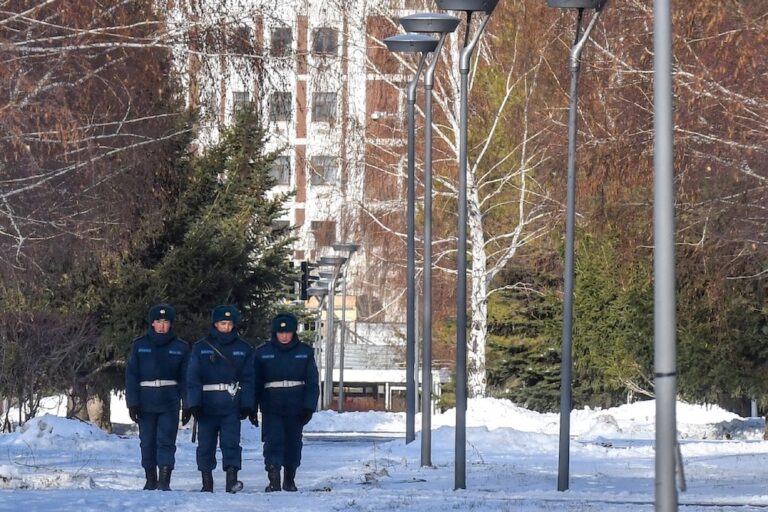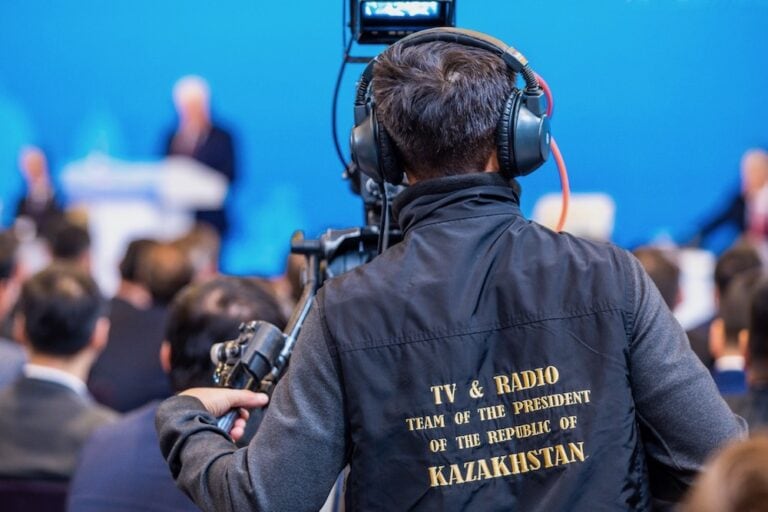ARTICLE 19 opposes this candidacy due to the poor human rights record of the Kazakh government and its failure to implement recent pledges to improve press freedom.
(ARTICLE 19/IFEX) – 11 March 2011 – ARTICLE 19 is extremely concerned about the possibility of Kazakhstan becoming a member of the UN Human Rights Council. ARTICLE 19 opposes this candidacy due to the poor human rights record of the Kazakh Government and its failure to implement all recent pledges to improve press freedom. We believe that the protection of human rights will be discredited if a government that constantly fails to fulfil its human rights commitments joins the highest UN human rights body. We call on the UN member states to vote against this candidacy.
“We oppose this candidacy, because we believe that the Kazakhstan Government is not a genuine supporter of human rights,” said Dr Agnes Callamard, ARTICLE 19 Executive Director. “The Kazakh government frequently violates human rights, including the right to freedom of expression, and has no place at this important institution.”
On 3 March 2011, the Kazakh Minister of Foreign Affairs, Kanat Saudabayev, announced in Geneva that his country has become a candidate for a seat at the UN Human Rights Council (HRC). According to Mr. Saudabayev, Kazakhstan deserves to become one of the 47 members of the inter-governmental body responsible for human rights protection around the globe in view of its commitment to human rights, active cooperation with all international human rights bodies and continuous voluntary contributions to the budget of the Office of the High Commissioner of Human Rights.
ARTICLE 19 considers that the human rights record of Kazakhstan, including the situation of media freedom, falls short of the standards set for council membership, including the obligation that the members uphold the “highest standards” of human rights. Our reviews of media legislation and monitoring of the situation of the press show that the respect and protection of free expression are extremely poor. We also note that the conduct of the Kazakh government during their 2010 chairmanship of the Organisation for Security and Cooperation in Europe (OSCE) shows no hope for improvements. Prior and during the OSCE chairmanship, the government made numerous pledges that remained unfulfilled. This demonstrates that the Kazakh authorities use the language of human rights to gain international prestige only.
The key shortfalls of the freedom of expression situation in Kazakhstan include both restrictive legislation and oppressive practices. In particular:
• The defamation legislation remains a serious problem, despite recent amendments of the Criminal Code in January 2011
• Journalists and media have no remedies against malicious plaintiffs who often bring clearly unsubstantiated cases with a view to exerting a chilling effect on media freedom
• Kazakh courts award disproportionately high compensation for defamation, enough to bankrupt media outlets
• Various administrative provisions restrict free speech in violation of human rights standards
• The right to freedom of information is not ensured in law, making it possible for the government to refuse to provide access to public information
• All internet blogs, chat rooms and social network sites are equated to traditional media, and are subjected to the same regulations as the press.
In addition to the problematic legislation, ARTICLE 19 is concerned about the jailing of journalists for political purposes. For example, the government has detained journalist Ramazan Yesergepov in prison since 6 January 2009 for revealing the illegal activities of the Kazakh secret service, though formally he was charged with making classified materials public. His trial was marred by irregularities.
The Kazakh authorities use administrative measures to muzzle independent voices. Recently the police seized all copies of the latest issue of the independent newspaper Respublika from a distribution truck on the grounds that it was “disseminating illegal information.” Editorial houses and printing press companies are often subjected to politically-motivated checks by state inspectors and tax authorities.
ARTICLE 19 notes with concern that state authorities fail to examine whether such interference in media freedom is legal or seek legal responsibility from individuals and institutions who illegally restrict free speech.
ARTICLE 19 considers that Kazakhstan like any state whose own media is not free and who does not respect human rights cannot be a human rights leader. The idea of human rights will be discredited if a government which constantly fails to fulfil its human rights commitments joins the Human Rights Council.
Concerned about human rights protection worldwide ARTICLE 19 calls on the member states of the UN:
• Not to elect Kazakhstan as a member of the UN Human Rights Council
• To press Kazakhstan to meet its international human rights duties including the obligation to protect freedom of expression.
ARTICLE 19 also calls on Kazakhstan authorities to:
• Immediately release from prison Ramazan Yesergepov
• Ensure that the defamation legislation meets international standards
• Adopt an access to information law and effectively implement it
• Stop the use of politically-motivated administrative measures to muzzle the press
• Remove the shortcomings of internet legislation, in particular the equating of forums, blogs, chats and other internet resources with traditional media
• Investigate all instances of interferences with freedom of expression and seek responsibility for illegal restrictions.


